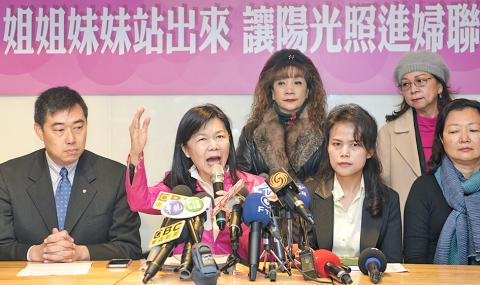Infighting within the National Women’s League surfaced yesterday as members of the league’s so-called “hawkish” faction urged league members to vote against signing an administrative contract with the government, which would see the organization’s dissolution, at a members’ meeting today.
Speaking at a news conference in Taipei, league Standing Committee member Pan Wei-kang (潘維剛) drew a parallel between the online movement against sexual harassment MeToo and a joint investigation by the Ministry of the Interior and the Cabinet’s Ill-gotten Party Assets Settlement Committee over the league’s alleged link to the Chinese Nationalist Party (KMT).
“At a time when the world is paying attention women’s rights issues, it is heart-wrenching to see a government led by a female president persecute the nation’s first women’s political group,” said Pan, a former KMT lawmaker.

Photo: Chang Chia-ming, Taipei Times
The league was neither a KMT affiliate, nor was it funded by illegitimately obtained party assets, Pan said, urging the Democratic Progressive Party (DPP) administration to refrain from labeling the league as such simply because it was established in 1950 by former president Chiang Kai-shek’s (蔣介石) wife Soong Mayling (宋美齡), who led the league for decades.
According to the contract, the league is required to apply for its dissolution within four months and donate 90 percent of its total assets, or about NT$34.3 billion (US$1.17 billion), to the state coffers, Pan said.
“Would inking the unclear, unfair and unjust contract really protect the league from further persecution?” Pan asked, adding that the league should defend its rights in court rather than giving them up without a fight.
According to a memorandum of understanding signed by the league’s new chairwoman Joanna Lei (雷倩), the ministry and the assets committee on Dec. 29 last year, the league has until today to sign the contract.
Failure to do so would result in a renewed government probe into the league’s alleged links with the KMT and its use of the Military Benefit Tax — a tariff levied on the US dollar value of all imported goods from 1955 to 1989 — that provided most of the funding for the league’s charity work.
The contract has divided league members into a “hawkish” faction, allegedly led by former league chairwoman Cecilia Koo (辜嚴倬雲), and a “pacifist” faction headed by Lei, who succeeded Koo last month after the latter was removed by the ministry for refusing to sign the contract and failing to provide detailed information regarding the league’s use of the tax.
Lei on Monday called for unity and expressed pessimism over the league’s future amid allegations that the hawkish faction plans today to smother the contract by asking as many league members as possible to sign a power of attorney to obtain their voting rights.
Koo’s attorney, Chi Pei-ching (稽珮晶), yesterday said Koo has maintained her opposition to signing the make-or-break contract, as doing so would not answer questions of whether the league was affiliated with the KMT or if it was funded by ill-gotten party assets.
“It would only damage the league’s legacy,” Chi said.

Alain Robert, known as the "French Spider-Man," praised Alex Honnold as exceptionally well-prepared after the US climber completed a free solo ascent of Taipei 101 yesterday. Robert said Honnold's ascent of the 508m-tall skyscraper in just more than one-and-a-half hours without using safety ropes or equipment was a remarkable achievement. "This is my life," he said in an interview conducted in French, adding that he liked the feeling of being "on the edge of danger." The 63-year-old Frenchman climbed Taipei 101 using ropes in December 2004, taking about four hours to reach the top. On a one-to-10 scale of difficulty, Robert said Taipei 101

Nipah virus infection is to be officially listed as a category 5 notifiable infectious disease in Taiwan in March, while clinical treatment guidelines are being formulated, the Centers for Disease Control (CDC) said yesterday. With Nipah infections being reported in other countries and considering its relatively high fatality rate, the centers on Jan. 16 announced that it would be listed as a notifiable infectious disease to bolster the nation’s systematic early warning system and increase public awareness, the CDC said. Bangladesh reported four fatal cases last year in separate districts, with three linked to raw date palm sap consumption, CDC Epidemic Intelligence

Taiwanese and US defense groups are collaborating to introduce deployable, semi-autonomous manufacturing systems for drones and components in a boost to the nation’s supply chain resilience. Taiwan’s G-Tech Optroelectronics Corp subsidiary GTOC and the US’ Aerkomm Inc on Friday announced an agreement with fellow US-based Firestorm Lab to adopt the latter’s xCell, a technology featuring 3D printers fitted in 6.1m container units. The systems enable aerial platforms and parts to be produced in high volumes from dispersed nodes capable of rapid redeployment, to minimize the risk of enemy strikes and to meet field requirements, they said. Firestorm chief technology officer Ian Muceus said

MORE FALL: An investigation into one of Xi’s key cronies, part of a broader ‘anti-corruption’ drive, indicates that he might have a deep distrust in the military, an expert said China’s latest military purge underscores systemic risks in its shift from collective leadership to sole rule under Chinese President Xi Jinping (習近平), and could disrupt its chain of command and military capabilities, a national security official said yesterday. If decisionmaking within the Chinese Communist Party has become “irrational” under one-man rule, the Taiwan Strait and the regional situation must be approached with extreme caution, given unforeseen risks, they added. The anonymous official made the remarks as China’s Central Military Commission Vice Chairman Zhang Youxia (張又俠) and Joint Staff Department Chief of Staff Liu Zhenli (劉振立) were reportedly being investigated for suspected “serious